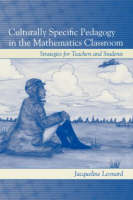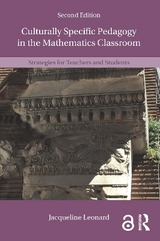
Culturally Specific Pedagogy in the Mathematics Classroom
Lawrence Erlbaum Associates Inc (Verlag)
978-0-8058-6105-1 (ISBN)
- Titel erscheint in neuer Auflage
- Artikel merken
"Culturally Specific Pedagogy in the Mathematic Classroom offers a wide variety of conceptual and curricular resources for teachers interested in teaching mathematics in a way that challenges stratification based upon race, class, gender and other forms of oppression that students face in today�s world�.
With the publication of this book, all teachers will have available to them instructional strategies in mathematics for meeting the academic needs of culturally diverse students. They will have an explanation of the linkage between culture and students� mathematical cognition and problem solving�. The ease in which Leonard brings the reader along, and the caring way she tells a story about making mathematics a fun and social justice experience makes for an exciting learning opportunity for all students and teachers."
Carl A. Grant, University Wisconsin-Madison, United States, From the Foreword
"Mathematics educators are in a period of deep concern about our ability to educate all students in mathematics. Most students of color do not have the opportunities to fully learn mathematics. Nothing more important can be done for these students and their teachers than to publish this book addressing the miseducation of these students and offering a way to change what we are doing."
Carol E. Malloy, University of North Carolina-Chapel Hill, United States
This compelling text advocates the use of culturally specific pedagogy to enhance the mathematics instruction of diverse students. It accomplishes this by making clear the link between research and practice and offering lesson templates that teachers can use with ethnically and culturally diverse students and with females. Specifically, the text draws on sociocultural theory and research on culture and mathematics cognition to focus on three goals: using qualitative research to extend the literature on culturally based education to African American and Latina/o c
@contents: Selected Contents: TABLE OF CONTENTS PREFACE v ACKNOWLEDGMENTS xi DEDICATION xiv LIST OF TABLES xv LIST OF FIGURES xvi LIST OF VIGNETTES xvii FOREWORD xviii CHAPTER 1: CULTURE, COMMUNITY, AND MATHEMATICS ACHIEVEMENT 1 Introduction 1 Mathematics Achievement in the U.S. 5 School Demographics and Education Reform 9 Theoretical Framework 12 Prior Research on Culturally Based Education 18 Teachers' Beliefs about Culture and Mathematics 23 Mathematics Identity and Mathematics Socialization 29 CHAPTER 2: COGNITION AND CULTURAL PEDAGOGY 33 Culture, Cultural Transmission, and Cultural Capital 33 Theories about Cognition and Culture 35 Cognitive Theory 36 The Saxe Model of Cognition 39 Children's Cognition and Learning in Mathematics 43 Culture and Children's Mathematical Reasoning 50 Reform-based Education to Opportunities to Learn 56 Definitions and Descriptions of Constructivism 63 Role of Culture in Constructing Knowledge 64 Beliefs about Constructivist Pedagogy 65 Summary 67 CHAPTER 3: CULTURAL PEDAGOGY 69 The Need for Cultural Pedagogy 69 Types of Cultural Pedagogy 73 Culturally Relevant Teaching 75 Cultural Brokering 78 Border Crossing 82 Culturally Responsive Teaching 85 Culturally Specific Pedagogy 87 Diversity Pedagogy 98 Summary 101 CHAPTER 4: PROBLEM SOLVING, PROBLEM POSING, MULTI-CULTURAL LITERATURE AND COMPUTER SCAFFOLDING 105 Introduction 105 How Children Learn to Solve Mathematics Problems 105 The Problem Solving Process 107 Learning to Pose Problems to Students 117 Using Multicultural Literature as a Context for Problem Solving 118 Emerging Technology and Problem Solving 122 Computer-Assisted Instruction 123 The Benjamin Banneker Project 127 The Classroom Discourse 128 The Computer Module 136 Analysis of Computer-based Mathematics Problems 138 Student Interviews 143 Analysis of Student Interviews 145 Teacher Interviews 147 Mr. Perez 147 Ms. Jordan 147 Ms. Clark 148 Analysis of Teacher Interviews 148 Discussion 149 Summary 150 CHAPTER 5: THE UNDERGROUND RAILROAD: A CONTEXT FOR LEARNING MATHEMATICS AND SOCIAL JUSTICE 152 On the Socialization of African American Children 152 The Mis-Education of African American Students in Mathematics 153 Linking Mathematics with Culture 156 Using Stars and Constellations as a Context for Learning Mathematics 158 The Case of Ms. Cho 158 The Case of Ms. Baker 165 Multicultural Literature, Mathematics Literacy and Social Consciousness 170 Sweet Clara and the Freedom Quilt 172 Analysis of Quilting Lesson 175 Making Connections to Issues of Social Justice 176 Linking Social Justice to Literacy 178 Analysis of Student Journals 181 Violence and Fear 183 Freedom for Self and Family 183 Determination and Hope 184 Summary 187 CHAPTER 6: WOMEN IN AVIATION AND SPACE: THE IMPORTANCE OF GENDER ROLE MODELS IN MATHEMATICS EDUCATION 190 Introduction 190 Gender Equity in Mathematics and Science 191 Gender and Academic Achievement in Mathematics 195 Single-Sex Education 202 Gender-Inclusive Culturally Specific Practices 204 The Bessie Coleman Project 205 Space Links: Integrating Space Science and Mathematics 210 Teacher Efficacy 213 Science Instruction 214 Preservice Teacher Reflections 221 Analysis of Reflections 223 Discussion 225 Implications 226 CHAPTER 7: LEARNING MATHEMATICS FOR EMPOWERMENT IN LINGUISTICALLY AND CULTURALLY DIVERSE CLASSROOMS 227 Introduction 227 Understanding Language Acquisition 232 Developing Additive Perspectives 237 Use of Multimedia to Support Mathematics Learning 238 Parental Involvement 244 Fostering Native Language Literacy in the Mathematics Classroom 246 Reflections of a Mathematics Educator 252 Reflections on Practice 252 Reflections on Classroom Research 260 CHAPTER 8: RACE AND ACHIEVEMENT IN MATHEMATICS 268 A Historical Perspective 268 Perspectives on the Achievement Gap 278 Mathematics Socialization and Identity among African American Students 282 Links to Everyday Mathematics 289 Conclusions and Recommendations 291 APPENDIX A: Research Methods: Benjamin Banneker Project 297 APPENDIX B: Interview Protocol 303 APPENDIX C: Culturally Specific Lesson Plans 304 APPENDIX D : Research Methods: Space Links 310 APPENDIX E: Galaxy Lab Sheet 313 APPENDIX F: Preservice Teacher Interview Protocol 314 REFERENCES 315 BIOGRAPHICAL NOTE 356
| Zusatzinfo | 6 Tables, black and white |
|---|---|
| Verlagsort | Mahwah |
| Sprache | englisch |
| Maße | 152 x 229 mm |
| Gewicht | 322 g |
| Themenwelt | Sozialwissenschaften ► Pädagogik |
| ISBN-10 | 0-8058-6105-X / 080586105X |
| ISBN-13 | 978-0-8058-6105-1 / 9780805861051 |
| Zustand | Neuware |
| Informationen gemäß Produktsicherheitsverordnung (GPSR) | |
| Haben Sie eine Frage zum Produkt? |
aus dem Bereich



